The Apple iPad Air 2 Review
by Joshua Ho on November 7, 2014 9:30 AM EST- Posted in
- Tablets
- Apple
- Mobile
- iOS
- ipad Air 2
CPU Performance
Now that we’ve managed to take a good look at the changes between the A8 and A8X, we can get a good idea of what those differences translate to in some real world performance. While we’ve already seen pure CPU performance, such differences can be small when viewed from real applications. To this end, we use a few browser benchmarks and similar benchmarks. I definitely want to caution against comparing SoCs across platforms though, as rendering engines have a significant effect upon the performance of the device.
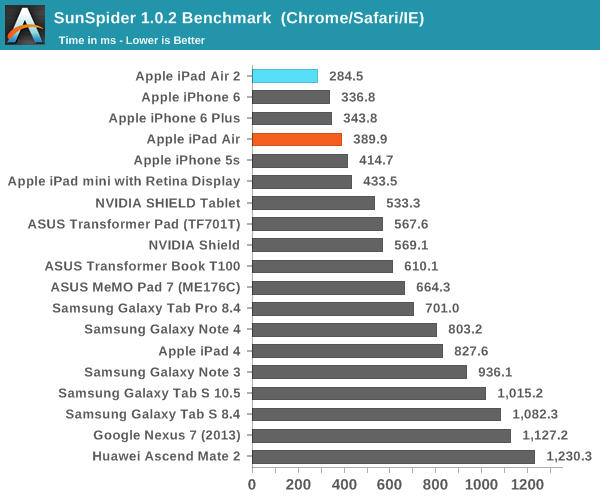
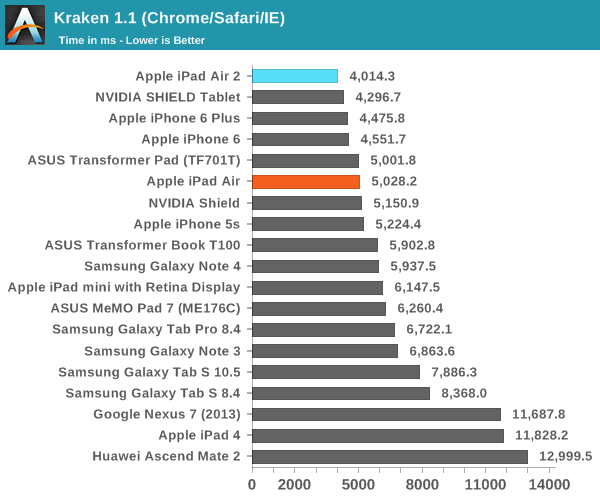
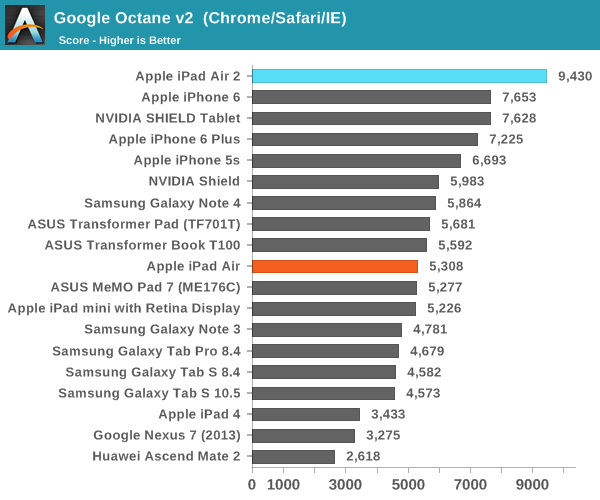
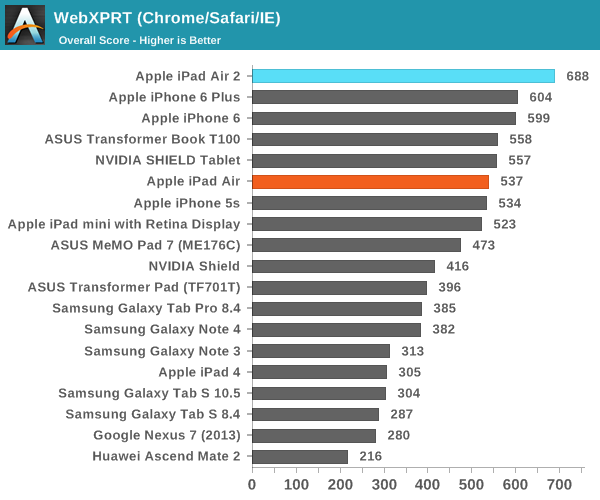
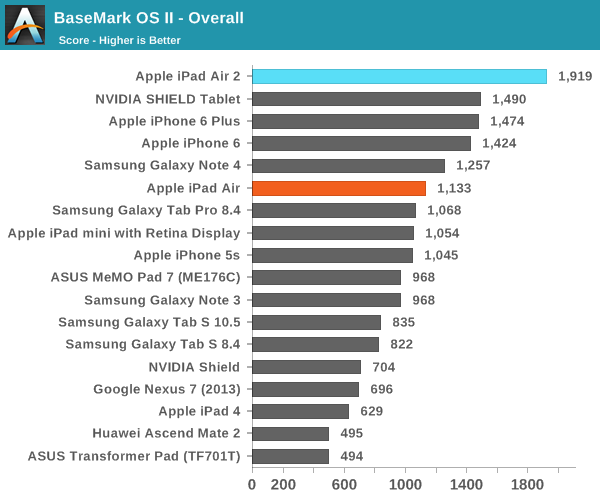
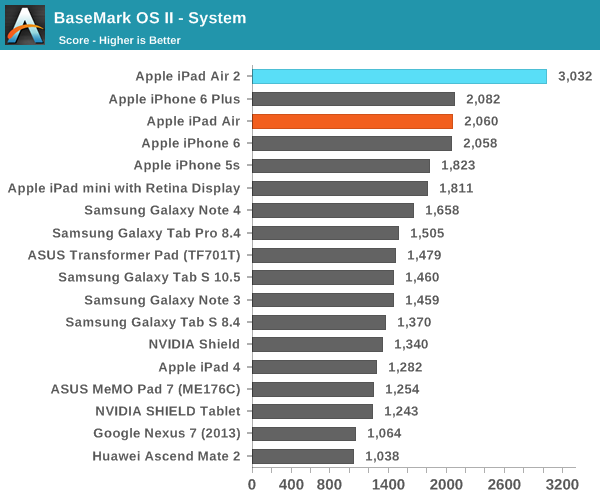
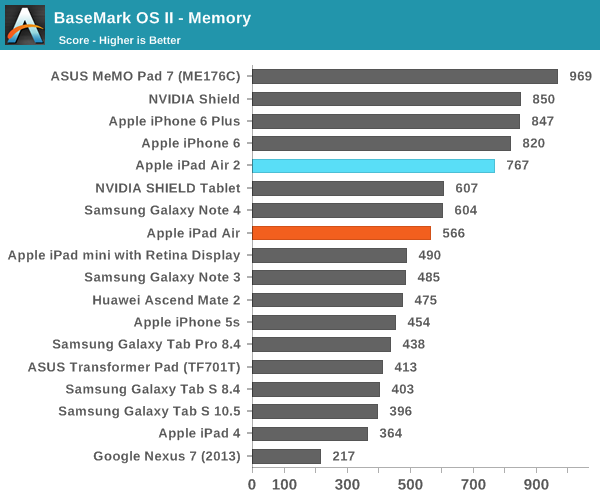
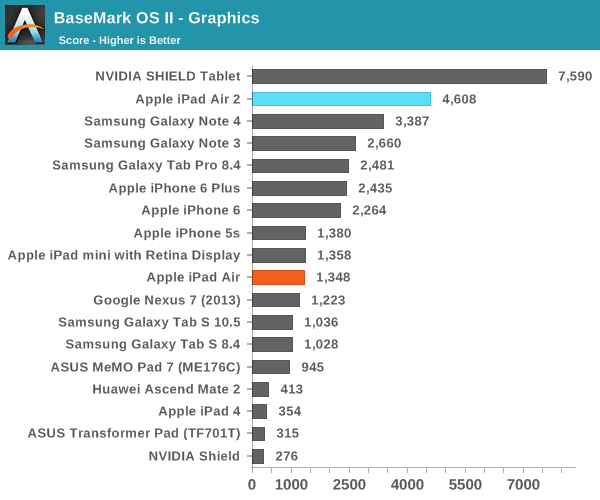
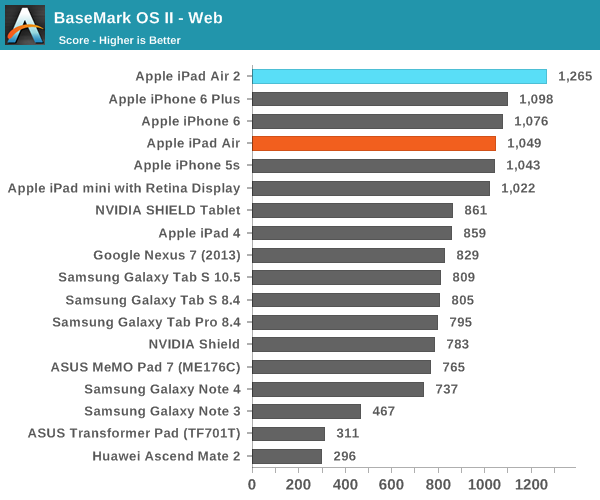
There's really not too much that needs to be said here, as the extra core and minor clock speed bump make for ridiculous amounts of performance. The A8X is class-leading here despite generally having fewer cores and lower clocks than the rest of the competition. However, in comparison to A8 we don't see a massive jump in performance. This seems to suggest that even a third core will invoke diminishing returns in general, although these changes mean that it's enough for the iPad Air 2 to be one of the fastest ARM-based devices on the market. One can see an odd regression in the Basemark OS II storage test, but this is likely to be production variances in NAND quality rather than anything notable.










226 Comments
View All Comments
name99 - Friday, November 7, 2014 - link
Roughly Haswell IPC is equal to Apple IPC. There are lots of caveats to this --- Apple does better on Geekbench, Intel does better on SPEC (probably because they have a superior memory system). Intel also have, to be fair, a much more mature compiler, while Apple can probably squeeze another 10% out of LLVM for ARM64 over the next year or two, along with some improvements to the SPEC numbers when their long awaited polyhedral optimizations finally go mainstream.I used to think Apple would ramp to higher frequencies, now I think a different trajectory is more likely. An Intel CPU is a bundle of many capabilities, and the CPU part is only one of these. There's also, for example, the turboing subsystem, and the profiling/debugging subsystem. My guess is that they are (even though they have said nothing about it) headed for the same sort of HSA future that AMD talks about.
I expect over the next few years, much Apple work will go into this sort of less than sexy infrastructure, stuff that Apple won't talk about much (if at all) and it will only make its appearance in things like better XCode tools and much less overhead to transfer code and data between CPU and GPU. Looking at the competitive landscape, Apple look like they could get away with an A9 improvement that's to the A8 as the A8 is to the A7 --- a steady 25%, one third from compiler, one third from another 100 or 150MHz boost, and one third from more tweaking of the CPU.
It's possible that this is indeed what we should expect because I'd guess that Apple's A-team for CPU design is hard at work on the AWatch project, and probably following the same strategy as we saw with CPUs --- the S1 will probably be a good but not spectacular SoC, something reliable to get the project rolling, the equivalent of A5. S2 will presumably be a substantial jump, with all the less risky optimizations they couldn't fit into S1, while S3 will knock it out of the park, taking the risk of project slippage to make use of every good idea the team has.
If this theory is correct, It may not be until A10 or so, as the team has hired more people and the watch project becomes more stable, that we get a rethinking of the phone/tablet CPU.
[Of course by then, who knows, maybe Apple will have announced iDust and mote CPUs will be what their CPU A-team are working on?]
anquietas - Friday, November 7, 2014 - link
Good perspective! This sounds lIke exactly how Apple would operate.iwod - Saturday, November 8, 2014 - link
This. Most people when comparing ARM64 SoC to Intel often fail to count the difference between the software ecosystem. Intel had much more engineers and years of optimization in libraries, and compiler. There are still quite lot of work to do on ARM64 and LLVM.JoshHo - Friday, November 7, 2014 - link
While we haven't included the Surface Pro 3 in comparisons as it's a much more expensive device, all of the tests in this review and more have been released to Bench where you can compare the two SoCs.ABR - Friday, November 7, 2014 - link
Just got back from checking the iPad Air at a store, and the performance was disappointing to say the least. I've got an iPad 2, and I keep reading about these leaps and bounds in the SOCs each year, but when it comes to a real-world task like opening the Mail app or paginating a novel in iBooks, this supposedly mind-blowingly smoking device is only incrementally faster than my 2nd gen clunker. What gives?I thought maybe everything was being bottlenecked by the flash access, but Josh tested that too and of course it looked way ahead of earlier hardware in that area too. iOS slowdowns? I'm running 7 instead of 8 on the Air 2, but that's only one generation behind.
Anyone have any idea what the deal is?
rUmX - Friday, November 7, 2014 - link
You need to be performing more intensive tasks to see the huge peperformance differences, as benchmarks show. Opening mail is not very demanding.ABR - Friday, November 7, 2014 - link
I guess you're saying maybe there's a floor effect with Mail opening given by the animation timers if nothing else, but how do you explain iBook pagination? That takes several seconds and seems to be computatin limited.Sushisamurai - Friday, November 7, 2014 - link
If u can't tell a difference, then maybe u should hold onto your iPad 2. I sold my iPad2-32GB wifi model for $200, just to upgrade to this Air 2. My iPad2 was stuttering and dropping frames for the apps I was using (also on iOS8). This Air 2 is absolutely amazing compared to the iPad2 - some of my daily apps can load, and reload (after downloading a minor update), before my other iPad2 finishes loading LOLABR - Saturday, November 8, 2014 - link
Maybe it's iOS 8 then. Good way to sell hardware. The big performance drop going to 7 is one of the reasons I'm not going any further yet. I'd get the Air 2 for the weight, retina, and fingerprint, not the SOC, but the way it runs hot is a big downgrade.Streamlined - Friday, November 7, 2014 - link
FYI, I was doing some financial analysis on Apple and the iPad Air 2 cost structure and I'm estimating that the "Apple Tax" on these is probably only a little more than $100 per unit on the 16gb wifi model.Read the details at www.perezonomics.com